

Domestic abuse: how to get help. Coronavirus (COVID-19) and domestic abuse The household isolation instruction as a result of coronavirus does not apply if you need to leave your home to escape domestic abuse.
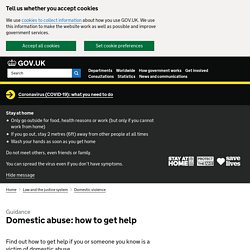
Domestic abuse in a relationship: recognise it Anyone can be a victim of domestic abuse, regardless of gender, age, ethnicity, socio-economic status, sexuality or background. There are different kinds of abuse that can happen in different contexts. The most prevalent type of domestic abuse occurs in relationships. For anyone who feels they are at risk of abuse, it is important to remember that there is help and support available to you, including police response, online support, helplines, refuges and other services.
If you answer yes to any of the following questions, you might be in an abusive relationship. Emotional abuse Does your partner, or former partner, ever: belittle you, or put you down? Threats and intimidation threaten to hurt or kill you? Physical abuse slap, hit or punch you? Sexual abuse Report it. How I curbed my helicopter parenting – and let my daughter jump through fire. One Saturday this summer I stood in a field and held my breath as I waited for my nine-year-old daughter Sofya to jump through a ring of fire.
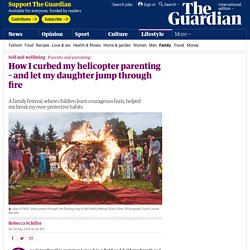
Despite her enthusiasm, the hours of practice she’d had with expert adults and the many fire marshals on duty, I could see she was in conflict: afraid of the flames and equally scared of not pushing herself through that fear into the unknown. As she watched her friends take their turns – tensing her body as they ran; wincing as they jumped; grinning and clapping when they were safely on the other side – I faced my own internal struggle. I was torn between scooping her up to a safe place away from all this heat and pressure, and standing back, trusting her and letting her take the risk. It felt like a rite of passage for us both. This mother/daughter moment of truth came as part of an annual family festival, Starry Skies, whose mission is to let the kids “roam free”.
Step by step: how to become a good parent – to someone else’s child. It was news to me that the actor Dakota Johnson was even going out with Coldplay frontman Chris Martin, but it’s already at the nth degree: Johnson was spotted on a coffee run with Apple Martin (his daughter with Gwyneth Paltrow, for the uninitiated).
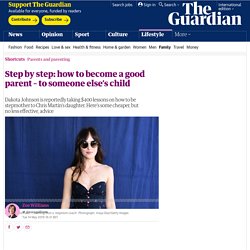
To cope with these new developments, Johnson has apparently enlisted the $400-an-hour help of Alison Task, a “stepmom coach”. Fine, fine, in the Keynesian sense. If one person has a lot of money and another person is willing to charge them a fortune for something, at least it keeps cash circulating. Parental Resentment Toward A Self-Centered Adolescent. When parents express ongoing resentment toward their adolescent, I take it seriously because of what it often connotes – a lack of adequate returns from the teenager in their relationship at a time when he or she has become increasingly preoccupied with developing a more individual, grown up, and independent sense of Self.
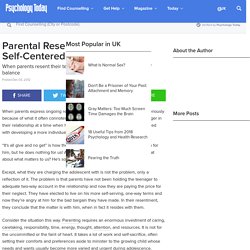
Ash Beckham: When to take a stand. Why Positive Reinforcement is Better than Punishment - Clever Little Monkey. Psychologists often encourage parents to adopt strategies of classic behaviour modification to alter their children’s challenging, naughty behaviours instead of using positive reinforcement techniques.
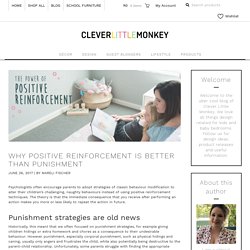
The theory is that the immediate consequence that you receive after performing an action makes you more or less likely to repeat the action in future. Punishment strategies are old news. Children with problems or problem children? There's nothing pleasant about being on the end of a child's angry or aggressive outburst - whether you're a parent or a teacher.
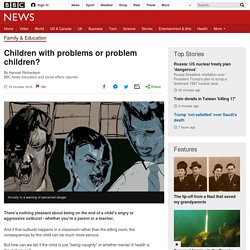
And if that outburst happens in a classroom rather than the sitting room, the consequences for the child can be much more serious. But how can we tell if the child is just "being naughty" or whether mental ill health is the root cause? After-school restraint collapse is real—here’s how to help your child. Hey, girls.
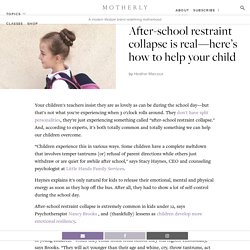
I thought it was time for a little check-in. We've been going through some stuff lately (raising a toddler, gearing up for the arrival of a new baby), and it occured to me that I haven't taken the time to let you know how much I appreciate you. If I'm honest, you rarely get the respect you deserve. Leave those kids alone: 'helicopter parenting' linked to behavioural problems. Children whose parents are over-controlling “helicopter parents” when they are toddlers, are less able to control their emotions and impulses as they get older apparently leading to more problems with school, new research suggests.
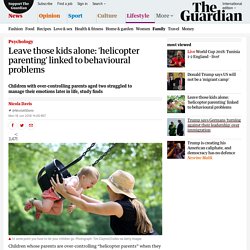
The study looked at to what degree mothers of toddlers dominated playtime and showed their child what to do, and then studied how their children behaved over the following eight years, revealing that controlling parenting is linked to a number of problems as a child grows up. “Parents who are over-controlling are most often very well-intentioned and are trying to support and be there for their children,” said Dr Nicole Perry of the University of Minnesota Twin Cities, who co-authored the research. At the age of five the team looked at the children’s response to an unfair share of sweets, and their ability to think carefully about a puzzle under time pressure. Why aren’t we talking about parenting teenagers? I’m lost AF. - renegade mothering. Headteacher encourages parents to take children sledging on snow day. We can all recall fond childhood memories of snow days; looking outside the bedroom window at the blanket of snow that’s settled overnight, wrapping up warm and heading straight to the park for some snowball fights with your friends.

A headteacher believes that those fun moments should be treasured, which is why he’s urged parents to take advantage of the frosty weather conditions by keeping their children home from school and enjoying the snow instead. Shaun Fenton is the headteacher of Reigate Grammar School, an independent day school for boys and girls in Reigate, Surrey.
While some disciplinarians prefer to run a tighter ship in regard to the snowfall, such as headteacher Ges Smith from Richardson Community School in East London who has banned his students from touching the snow due to “health and safety” concerns, others are adopting a far more light-hearted approach. Tips for Keeping a Gratitude Journal. Psychology researchers aren’t necessarily Thanksgiving experts—they may not know how to make fluffy stuffing, say, or beat the traffic to your in-laws’ house—but they have become a fount of wisdom on thanksgiving (with a small “t”).
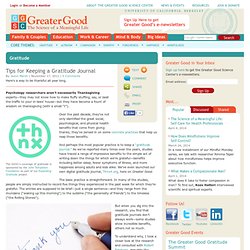
Over the past decade, they’ve not only identified the great social, psychological, and physical health benefits that come from giving thanks; they’ve zeroed in on some concrete practices that help us reap those benefits. And perhaps the most popular practice is to keep a “gratitude journal.” As we’ve reported many times over the years, studies have traced a range of impressive benefits to the simple act of writing down the things for which we’re grateful—benefits including better sleep, fewer symptoms of illness, and more happiness among adults and kids alike. We’ve even launched our own digital gratitude journal, Thnx4.org, here on Greater Good. The basic practice is straightforward.